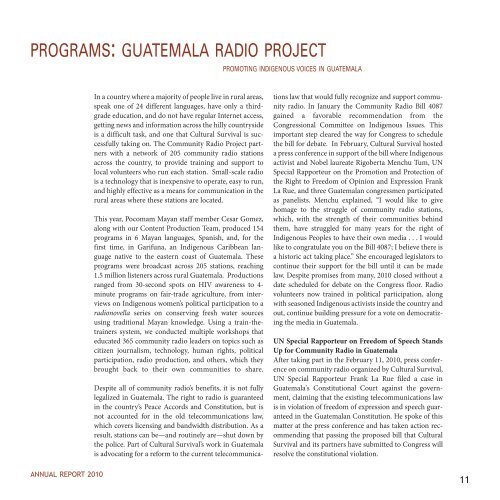Annual Report 2010 - Cultural Survival
Annual Report 2010 - Cultural Survival
Annual Report 2010 - Cultural Survival
You also want an ePaper? Increase the reach of your titles
YUMPU automatically turns print PDFs into web optimized ePapers that Google loves.
PROGRAMS: GUATEMALA RADIO PROJECT<br />
ANNUAL REPORT <strong>2010</strong><br />
In a country where a majority of people live in rural areas,<br />
speak one of 24 different languages, have only a thirdgrade<br />
education, and do not have regular Internet access,<br />
getting news and information across the hilly countryside<br />
is a difficult task, and one that <strong>Cultural</strong> <strong>Survival</strong> is successfully<br />
taking on. The Community Radio Project partners<br />
with a network of 205 community radio stations<br />
across the country, to provide training and support to<br />
local volunteers who run each station. Small-scale radio<br />
is a technology that is inexpensive to operate, easy to run,<br />
and highly effective as a means for communication in the<br />
rural areas where these stations are located.<br />
This year, Pocomam Mayan staff member Cesar Gomez,<br />
along with our Content Production Team, produced 154<br />
programs in 6 Mayan languages, Spanish, and, for the<br />
first time, in Garifuna, an Indigenous Caribbean language<br />
native to the eastern coast of Guatemala. These<br />
programs were broadcast across 205 stations, reaching<br />
1.5 million listeners across rural Guatemala. Productions<br />
ranged from 30-second spots on HIV awareness to 4minute<br />
programs on fair-trade agriculture, from interviews<br />
on Indigenous women’s political participation to a<br />
radionovella series on conserving fresh water sources<br />
using traditional Mayan knowledge. Using a train-thetrainers<br />
system, we conducted multiple workshops that<br />
educated 365 community radio leaders on topics such as<br />
citizen journalism, technology, human rights, political<br />
participation, radio production, and others, which they<br />
brought back to their own communities to share.<br />
Despite all of community radio’s benefits, it is not fully<br />
legalized in Guatemala. The right to radio is guaranteed<br />
in the country’s Peace Accords and Constitution, but is<br />
not accounted for in the old telecommunications law,<br />
which covers licensing and bandwidth distribution. As a<br />
result, stations can be—and routinely are—shut down by<br />
the police. Part of <strong>Cultural</strong> <strong>Survival</strong>’s work in Guatemala<br />
is advocating for a reform to the current telecommunica-<br />
PROMOTING INDIGENOUS VOICES IN GUATEMALA<br />
tions law that would fully recognize and support community<br />
radio. In January the Community Radio Bill 4087<br />
gained a favorable recommendation from the<br />
Congressional Committee on Indigenous Issues. This<br />
important step cleared the way for Congress to schedule<br />
the bill for debate. In February, <strong>Cultural</strong> <strong>Survival</strong> hosted<br />
a press conference in support of the bill where Indigenous<br />
activist and Nobel laureate Rigoberta Menchu Tum, UN<br />
Special Rapporteur on the Promotion and Protection of<br />
the Right to Freedom of Opinion and Expression Frank<br />
La Rue, and three Guatemalan congressmen participated<br />
as panelists. Menchu explained, “I would like to give<br />
homage to the struggle of community radio stations,<br />
which, with the strength of their communities behind<br />
them, have struggled for many years for the right of<br />
Indigenous Peoples to have their own media . . . I would<br />
like to congratulate you on the Bill 4087; I believe there is<br />
a historic act taking place.” She encouraged legislators to<br />
continue their support for the bill until it can be made<br />
law. Despite promises from many, <strong>2010</strong> closed without a<br />
date scheduled for debate on the Congress floor. Radio<br />
volunteers now trained in political participation, along<br />
with seasoned Indigenous activists inside the country and<br />
out, continue building pressure for a vote on democratizing<br />
the media in Guatemala.<br />
UN Special Rapporteur on Freedom of Speech Stands<br />
Up for Community Radio in Guatemala<br />
After taking part in the February 11, <strong>2010</strong>, press conference<br />
on community radio organized by <strong>Cultural</strong> <strong>Survival</strong>,<br />
UN Special Rapporteur Frank La Rue filed a case in<br />
Guatemala's Constitutional Court against the government,<br />
claiming that the existing telecommunications law<br />
is in violation of freedom of expression and speech guaranteed<br />
in the Guatemalan Constitution. He spoke of this<br />
matter at the press conference and has taken action recommending<br />
that passing the proposed bill that <strong>Cultural</strong><br />
<strong>Survival</strong> and its partners have submitted to Congress will<br />
resolve the constitutional violation.<br />
11


